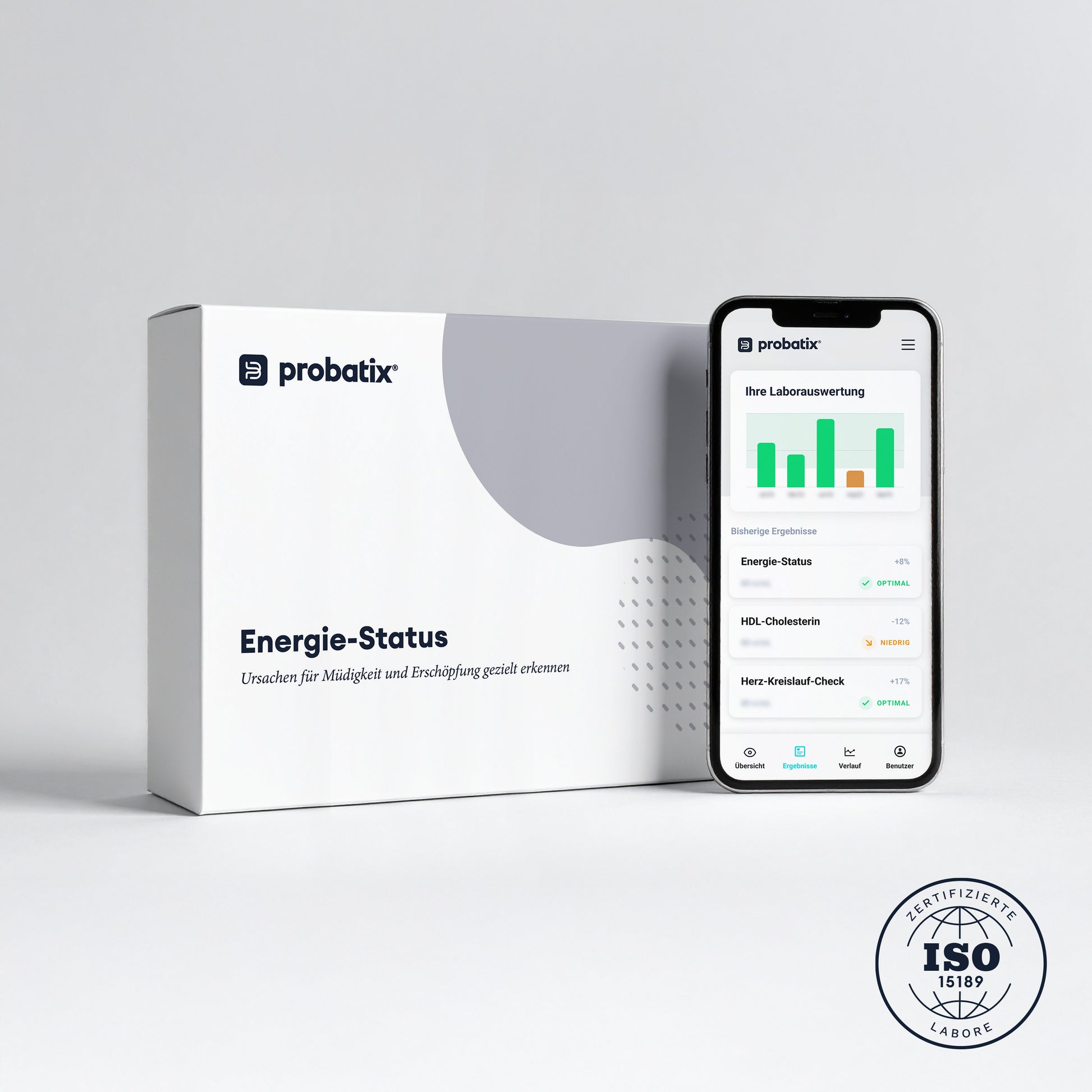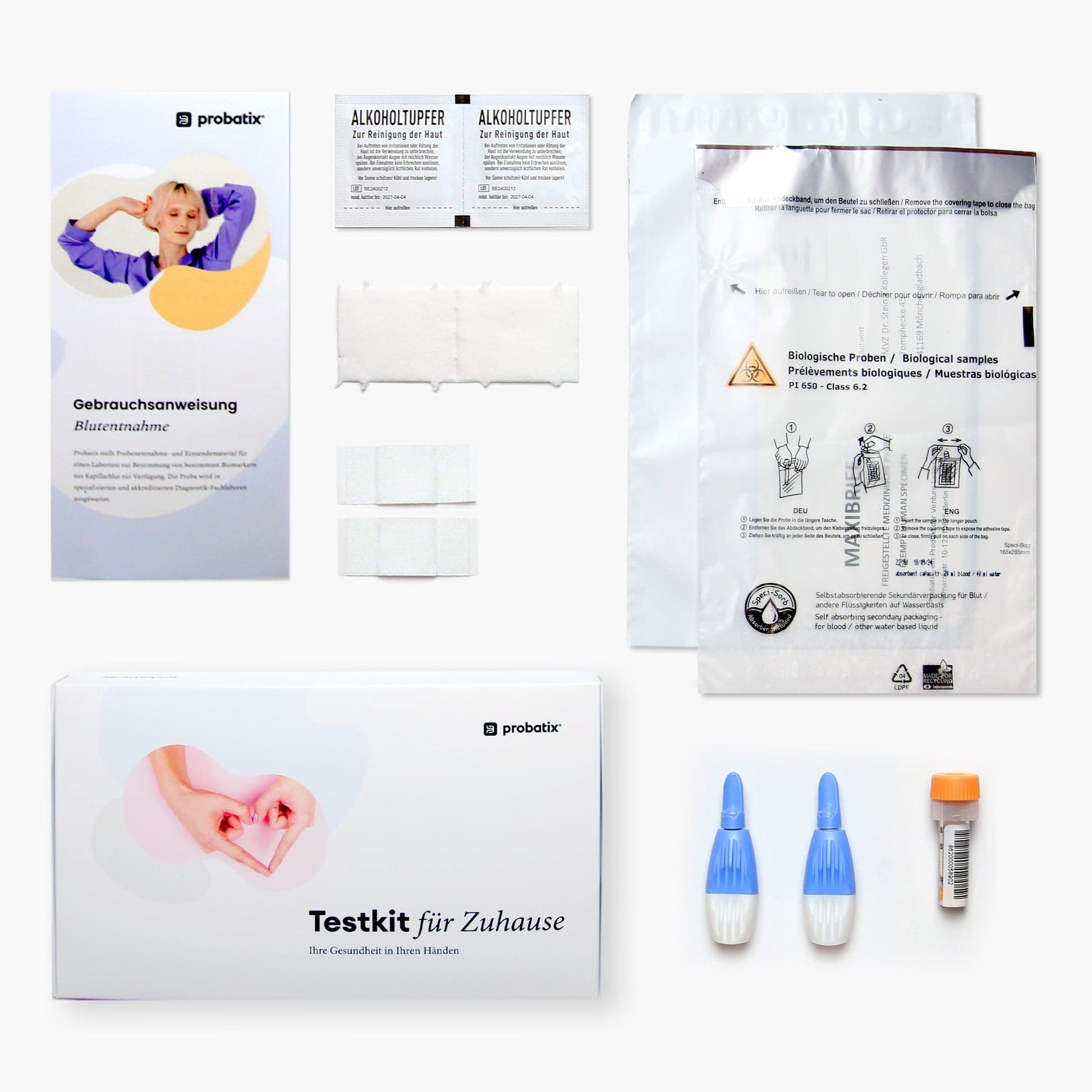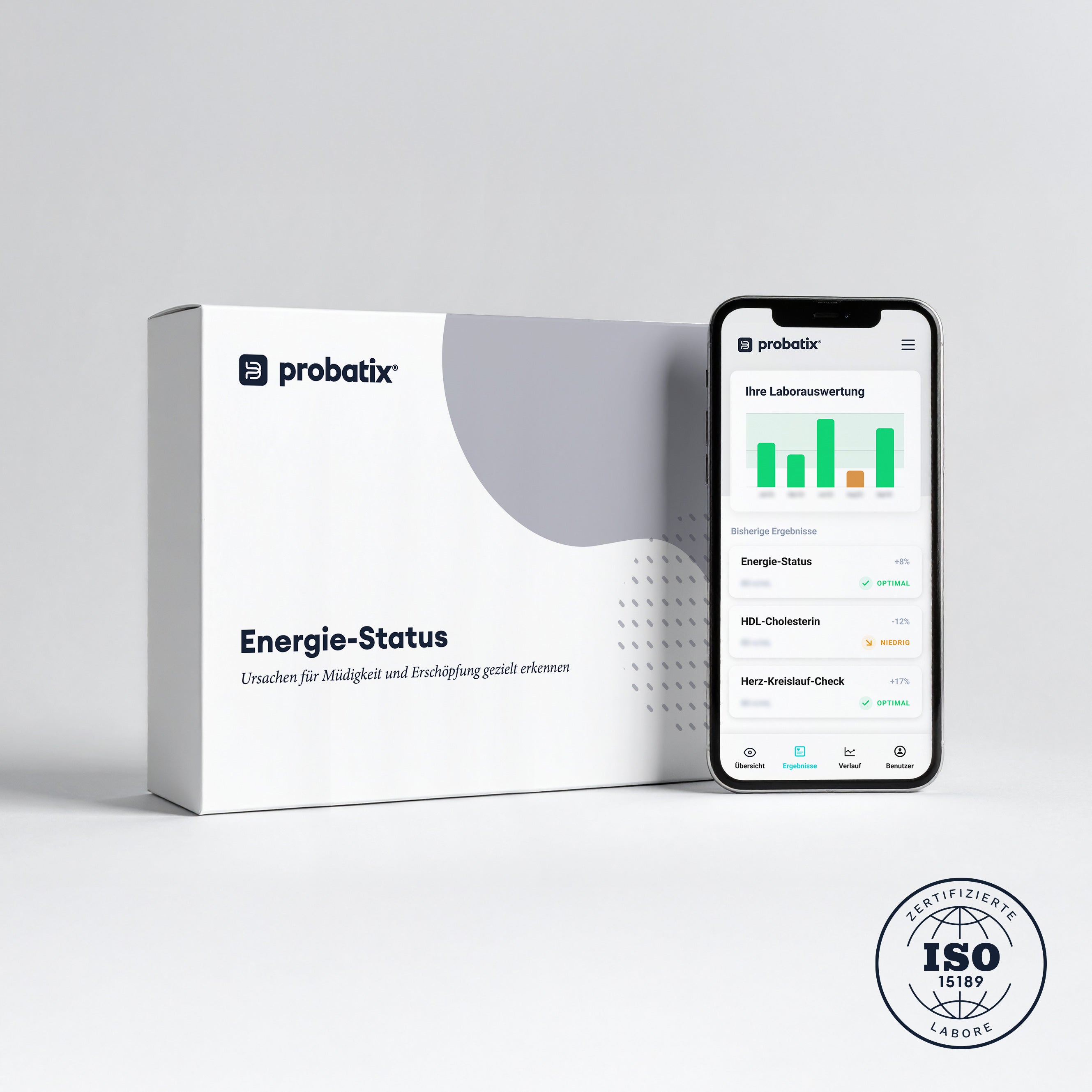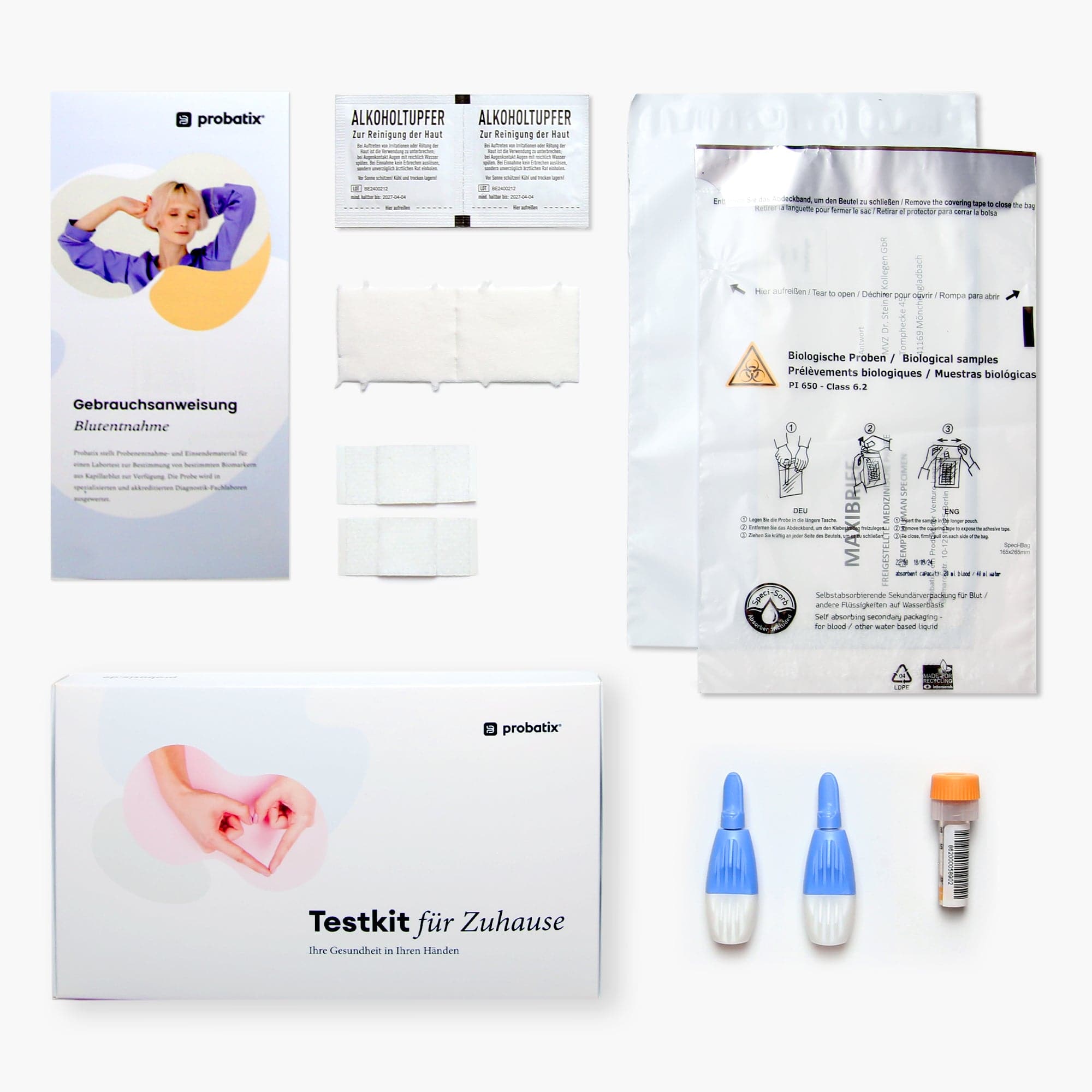Energy Status
Energy Status
Find out why you are constantly tired – and regain your energy.
- Understand the causes: The energy status measures values such as Vitamin D, Vitamin B12, Ferritin, Bilirubin, Sodium, fT3, fT4, and TSH as well as liver (GGT, GPT), kidney (Cystatin C), and inflammation markers (CRP). This allows for the identification of nutrient deficiencies, hormonal disorders, or organ stress as possible causes of fatigue.
- Targeted insights: Clear lab results show you whether your exhaustion is due to vitamin deficiency, impaired thyroid function, or silent inflammation – and enable targeted actions.
- Simple & convenient: Collect a blood sample flexibly at home, professional evaluation in a specialized lab, and clear results in the dashboard.
Because constant fatigue always has a cause – and you can finally uncover it with the energy status.
In Stock
What values does this test measure?
What values does this test measure?
Further information on the values can be found here.
How does it work?
How does it work?
1. Take a sample with our test kit
2. Send the sample to the lab using the prepaid envelope
3. View results digitally after a few days
Why are the values reliable?
Why are the values reliable?
All tests offered by us are evaluated and validated in certified medical laboratories in Germany.
This is what the press says about our tests
Energy Status: All details about the test
What benefits does this test offer me?
What benefits does this test offer me?
Are you constantly tired, lacking drive, or feeling exhausted despite getting enough sleep? The Energy Status helps you identify the reasons for your fatigue and take targeted action against it.
What you gain:
- A clear understanding of the causes of your fatigue and exhaustion.
- Insight into your nutrient status (Vitamin D, B12, Ferritin), your thyroid values (TSH, fT3, fT4), as well as liver and kidney values (GGT, GPT, Bilirubin, Cystatin C).
- Concrete results that help you take targeted measures to regain energy and quality of life.
Why this test is so important:
Fatigue is often a signal that your body needs support – whether through better nutrient supply, a balanced hormone level, or the reduction of silent inflammations.The Energy Status makes these connections visible and helps you actively improve your health.
Rediscover your energy – simple, safe, and fast.
What do the measured values mean?
What do the measured values mean?
25-OH vitamin D is the storage form of vitamin D that the body produces in the liver from vitamin D formed with sunlight or food. Vitamin D supports calcium absorption, ensures healthy bones and teeth, and plays an important role for muscles, nerves, and the immune system.
The 25-OH vitamin D test is the best method to check vitamin D status. Low levels can indicate too little sunlight, an unbalanced diet, or diseases and are associated with bone diseases such as osteoporosis or rickets. Excessive levels usually result from too high supplement doses and can strain the kidneys and liver.
Vitamin B12
Vitamin B12 is an essential vitamin required for the formation of red blood cells, the functioning of the nervous system, and the production of DNA. It is found almost exclusively in animal foods such as meat, fish, eggs, and dairy products.
A deficiency in Vitamin B12 can lead to anemia, fatigue, concentration problems, and nerve damage. Those at increased risk for a deficiency include primarily older people, vegetarians, vegans, or individuals with absorption disorders in the intestine.
Bilirubin, total
Bilirubin is produced during the breakdown of the red blood pigment hemoglobin and is further processed in the liver. It enters the intestine via the bile and is eventually excreted. The total bilirubin level in the blood indicates how well this breakdown and excretion process is functioning.
Slightly elevated levels can be harmless, such as in the case of Gilbert's syndrome. However, significantly elevated levels can indicate liver or bile duct diseases and often lead to a yellowing of the skin and eyes (jaundice).
C-reactive protein (CRP)
CRP (C-reactive protein) is a protein that the liver produces in response to inflammation. The level in the blood rises quickly when infections, tissue damage, or other inflammatory processes occur in the body. Therefore, CRP is often used as a general marker of inflammation.
A significantly elevated CRP level usually indicates an acute infection, while slightly elevated levels can also occur in chronic diseases. Normal values generally rule out a relevant inflammation.
Cystatin C
Cystatin C is a protein that is produced in all body cells and is filtered out of the blood by the kidneys. Since the production of Cystatin C in the body is relatively constant, the value is well-suited for assessing kidney function.
In contrast to creatinine, Cystatin C rises early when kidney performance declines. Therefore, it is considered a sensitive marker for timely detection of early kidney weakness.
Ferritin
Ferritin is a protein that stores iron in the body and releases it when needed. The ferritin level in the blood indicates how well the body's iron stores are filled and is therefore often used to assess iron status.
Low values usually indicate an iron deficiency or anemia. Elevated values may suggest inflammation, liver diseases, or iron overload.
Sodium
Sodium is an important mineral and electrolyte that regulates the body's water and salt balance. It also plays a central role in nerve signal transmission and muscle function. The body usually maintains sodium levels within a narrow range to keep essential functions stable.
Excessive levels (hypernatremia) often occur with fluid deficiency and can trigger thirst, confusion, or seizures. Low levels (hyponatremia) can result from significant fluid loss, kidney problems, or certain medications, leading to weakness, headaches, and, in extreme cases, consciousness disorders.
fT4 (free thyroxine)
fT4 is the precursor of the active hormone T3 and is predominantly produced by the thyroid gland. It circulates in the blood and can be converted into T3 in the organs to stimulate metabolism.
High fT4 levels typically indicate an overactive thyroid. Low levels, on the other hand, suggest an underactive thyroid.
TSH
TSH (Thyroid-stimulating hormone) is produced in the pituitary gland and controls the activity of the thyroid gland. It stimulates the thyroid to produce the hormones T3 and T4, which influence metabolism and many body functions.
High TSH levels usually indicate an underactive thyroid, as the body tries to boost hormone production. Low TSH levels, on the other hand, suggest an overactive thyroid.
fT3 (free triiodothyronine)
fT3 is the active form of the thyroid hormone that acts directly in the cells and regulates metabolism. It influences heart rate, energy consumption, digestion, and many other body functions. A large portion is produced by the conversion of the hormone T4 into T3 in the liver and kidneys.
Elevated fT3 levels usually indicate hyperthyroidism, while low levels may suggest hypothyroidism or a disturbance in the conversion of T4 to T3.
Why is this test important?
Why is this test important?
html
Because fatigue should not be a permanent condition.
Persistent fatigue and lack of drive can significantly impair your quality of life and are often a signal from your body that something is wrong.
The Energy Status gives you the opportunity:
- To identify the causes of your fatigue and exhaustion – whether due to nutrient deficiencies, hormonal changes, or silent inflammations.
- To take early action before small problems develop into larger burdens.
- To regain your energy and vitality and feel full of life again.
With the Energy Status, you receive a simple and effective way to better understand and specifically support your health.
When should I take this test?
When should I take this test?
If fatigue determines your everyday life.
- Frequently feeling tired and drained without an apparent cause.
- Feeling like you never really recover despite getting enough sleep.
- Noticing persistent concentration problems or lack of energy.
- Wanting to clarify whether nutrient deficiencies, hormonal imbalances, or stress are behind it.
- Preventively check your health to remain productive in the long term.
What is included in the test kit?
What is included in the test kit?
Where can I find the instructions?
Where can I find the instructions?
Bei Fragen hilft Ihnen auch immer gerne unser wunderbarer Support weiter: support@probatix.de
FAQ - More Frequently Asked Questions about the Test
FAQ - More Frequently Asked Questions about the Test
What is examined in the energy status?
The test analyzes important blood values such as Vitamin D, Vitamin B12, Ferritin, Bilirubin, Sodium, fT3, fT4, TSH, as well as liver (GGT, GPT), kidney (Cystatin C), and inflammation markers (CRP). This helps identify possible causes of persistent fatigue and exhaustion.
Who is this test suitable for?
The energy status is ideal for anyone who often feels tired, listless, or exhausted and wants to better understand the reasons for it – whether due to nutrient deficiencies, hormonal imbalances, or organ stress.
How does the sampling work?
The sampling is conveniently done from home with a capillary blood test from the fingertip. You will receive a test kit with detailed instructions for easy execution.
How long does it take to receive my results?
After sending the sample to our specialized laboratory, your results are usually available digitally on the dashboard within 3–5 business days.
What can I deduce from the results?
The results indicate whether there are nutrient deficiencies, hormonal imbalances, or other stressors that could explain your fatigue – and provide guidance on how to counteract them effectively.
What happens if my values are outside the reference range?
If your values are abnormal, you should discuss the results with a doctor. They can initiate further examinations and recommend appropriate measures.
Can fatigue be caused by nutrient or hormone deficiencies?
Yes, particularly deficiencies in Vitamin D, Vitamin B12, or iron (ferritin), as well as thyroid disorders, are common causes of fatigue.The test helps to detect these at an early stage.
How reliable are the results?
The analysis is carried out in a certified specialist laboratory according to the highest medical standards – precise and reliable.
Das sagen unsere Kunden
Your benefits for your health
Test with minimal effort
Understanding Your Own Health
Recognize changes early
















